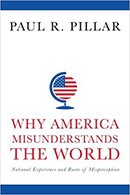The United States’ historical advantages cause its people to misperceive international affairs, according to Why America Misunderstands the World: National Experience and Roots of Misperception. The author, Paul Pillar, who spent most of his career interpreting foreign actions at the CIA, argues that intelligence analysis has limited impact on how U.S. policy-makers look at the world. American culture, which comes from historical experience, instead plays the leading role.
That experience has been exceptionally fortunate, Pillar writes. Geographic remoteness from threatening rivals, abundant resources, and a liberal consensus produced great wealth, safety, power and political stability. Americans often take these blessings for granted, Pillar argues, or as proof of innate superiority.
One result is underestimation of the difficulties foreign nations face in achieving security, prosperity and unity. Another is overestimation of U.S. power to correct foreign troubles. We tend, according to Pillar, toward a Manichean worldview, where the goodness of U.S. action is taken as obvious, nationalistic resistance to it is surprising, and hostile actors’ unity and aggression is routinely exaggerated.

